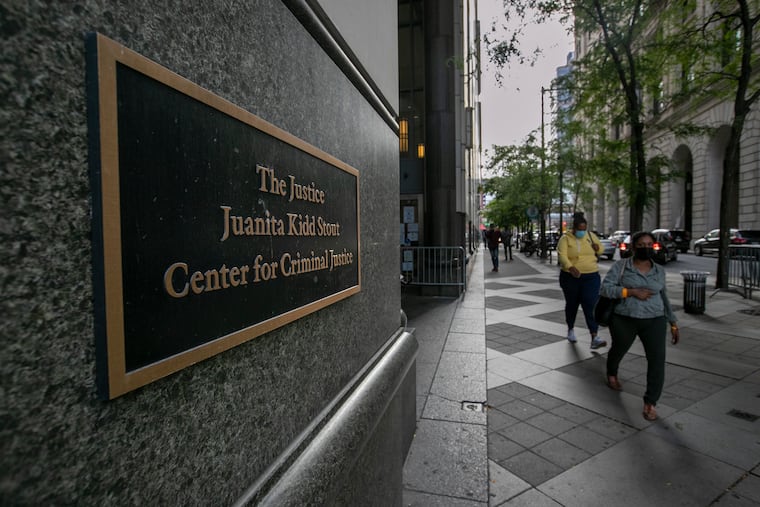City Council criticizes Philly courts for inaction on systemic racism
Two Black female judges said they have faced discrimination and hatred, and criticized court leadership for inaction. Court leaders said there are plans for implicit bias training.

Philadelphia’s court system came under fire at a City Council hearing Monday for inaction after a report the court commissioned found a “culture of nepotism, mistrust and racial tension” among judges and staff members.
Two Black female judges said they have experienced hate and discrimination from fellow judges and a lack of commitment from court leadership to address systemic racism.
The president of the organization that completed the report said she stopped hearing back from court leadership after delivering it — even though her contract involved ongoing work to provide training.
And Council members criticized Common Pleas President Judge Idee C. Fox for declining to testify at Monday’s committee hearing. Councilmember Kenyatta Johnson, who called for Monday’s hearing, said it was “totally unacceptable” that Fox declined to testify.
“It’s not about one branch of government vs. another branch of government,” Johnson said. “It’s about transparency and addressing the issue of institutional racism.”
But in a letter submitted in lieu of testimony, District Court Administrator Richard T. McSorley pushed back on some of Council’s accusations and asked lawmakers to reflect on the issues of favoritism and nepotism highlighted in the report. They are “deeply embedded in this city’s culture,” and not unique to the courts, he said.
“These factors are among the most formidable internal impediments we in government face,” McSorley wrote. “We have asked our judges to reflect on that notion, and we kindly ask this gracious Council to do the same.”
The First Judicial District, the city’s local court system, commissioned the independent report in 2018 from the Center for Urban and Racial Equality (CURE), a Washington-based organization. The report was based on surveys and focus groups of some of the court’s more than 2,400 employees, and found serious problems with diversity, equity, and inclusion.
After it was completed in 2019, there was a yearlong delay before its release in July. It was made public after a letter from Judge Karen Y. Simmons, who was the victim of a racist and sexist attack while she was running to become president judge of municipal court in 2018, wrote a letter pushing for its release. Fourteen Council members also wrote a letter urging its release.
Simmons testified Monday about the threat she received and the subsequent response from court leadership. The threat came via an interoffice note passed through the judges’ robing room, a private area for judges, and said: “There Will Never Be a Black [expletive] Running Our Court. You Won’t be President Judge!!!”
It was dismissed and not investigated or addressed officially by the court, Simmons said — even though it appeared to come from a fellow judge or court staff member.
“They had the ability as leaders to send a clear message that my life mattered and that this Black female judge mattered,” she said. “Had the same type note been left for a Jewish person or a white woman, the [Administrative Governing Board’s] response would have been vastly different. There would have been a strong, swift, and clear response.”
Judge Roxanne Covington, the only other judge who testified Monday, said she received a death threat earlier this year. While threats are fairly common for judges, Covington said she was disappointed that it was difficult for her to get security protection in response, while white judges did have security details.
Since the report’s release, “I can tell you that not only has nothing changed, but things have continued and gotten worse — in particular for Black female judges,” she said.
Covington said she worries about the court system’s ability to treat citizens fairly if its own judges and staff members are subjected to discrimination. The court system needs “something more than sending out a statement or holding a training,” she said.
Judy Lubin, CURE’s president, told Council members Monday that she stopped hearing back from the First Judicial District after she delivered the report in 2019, and she eventually asked for the termination of the contract due to the court’s unresponsiveness. She recently heard back from the court, she said, and will have “exploratory conversations” later this week about conducting implicit bias training.
“There needs to be transparency, there needs to be accountability, and that needs to be an open and ongoing process,” Lubin said.
McSorley’s letter said judicial and administrative leaders completed implicit bias training in October, and similar training sessions are planned for all court employees.
Gabriel Roberts, a spokesperson for the First Judicial District, said in a statement Monday that the court’s Administrative Governing Board “is moving with sustained urgency to address the issues raising in the CURE Report.”
The board “is committed to implementing the recommendations outlined in the CURE report as well as making diversity, equity, and inclusion ongoing priorities for the courts,” Roberts said.